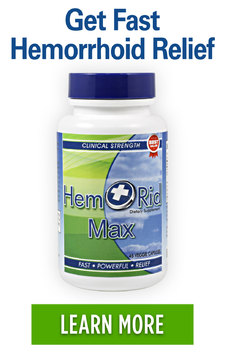Can Hemorrhoid disappear on their own?
Posted on 12 June 2024 by Musab Zubair
Share this post
Hemorrhoids. Just the word itself can send shivers down your spine. These swollen veins around the anal canal are a common discomfort, affecting millions of people worldwide. And one of the most burning questions people have is: can hemorrhoids simply vanish without any treatment?
The answer, like many things in life, isn't a simple yes or no. Whether hemorrhoids disappear on their own depends on a few key factors, but there's good news! Many, especially milder cases, have the potential to self-resolve with a little tender loving care... for your bottom!
The Great Hemorrhoid Grades: Severity Matters
Hemorrhoids come in grades, much like a movie rating system. Each grade indicates the severity and location of the hemorrhoid:
- Grade 1: These internal hemorrhoids stay put inside the rectum and typically cause minimal discomfort. They're the most likely candidates for disappearing on their own.
- Grade 2: Internal hemorrhoids protrude slightly during bowel movements but shrink back inside on their own. With some home care, these have a good chance of resolving naturally.
- Grade 3: Internal hemorrhoids that protrude during bowel movements and may require some pushing or straining to go back in. These might need a combination of home care and potentially a doctor's intervention.
- Grade 4: These hemorrhoids protrude permanently outside the anus. Unfortunately, self-resolution is unlikely for these, and medical attention is typically recommended.
The Disappearing Act: When Hemorrhoids Say Buh-Bye
So, when can you expect your hemorrhoids to pack their bags and head for the exit? Let's explore some scenarios where self-resolution is a possibility:
- The Power of Poop: Believe it or not, healthy bowel habits play a crucial role. Eating a fiber-rich diet full of fruits, vegetables, and whole grains helps soften stools, making them easier to pass. Softer stools mean less straining, which is a major contributor to hemorrhoids. By keeping things moving smoothly, you can create an environment conducive to natural healing, potentially allowing those Grade 1 and 2 hemorrhoids to disappear.
- The Soothing Sitz Bath: Picture a warm, comforting soak for your lower body. That's the magic of a sitz bath! Filling a tub with warm water (around 10 - 15 minutes) and soaking several times a day can be incredibly good for hemorrhoids. The warmth helps reduce inflammation and irritation, promoting healing and potentially aiding in the resolution of milder hemorrhoids.
- The Gentle Touch: Maintaining proper hygiene is essential, but being too harsh can actually worsen hemorrhoids. Avoid using harsh soaps, wipes, or douches, as these can irritate the delicate skin around the anus. Instead, opt for gentle cleaning with warm water and a mild, fragrance-free soap after each bowel movement. Pat the area dry with a soft towel or allow it to air dry completely.
When to Seek Medical Attention
While mild hemorrhoids often resolve on their own with self-care measures, there are instances when medical attention is necessary:
- Persistent Symptoms: If symptoms persist for more than a week despite self-care measures, it is advisable to consult a healthcare professional. Persistent pain, bleeding, or discomfort may indicate a more severe condition.
- Severe Pain or Bleeding: Intense pain or significant rectal bleeding requires immediate medical evaluation. These symptoms could be indicative of a more serious issue such as a thrombosed hemorrhoid or colorectal cancer.
- Prolapsed Hemorrhoids: If internal hemorrhoids protrude through the anus and do not retract on their own, medical treatment may be required to prevent further complications.
Medical Treatments for Hemorrhoids
When hemorrhoids do not resolve on their own or with self-care measures, medical treatments may be necessary. Here are some common medical interventions:
- Rubber Band Ligation: This minimally invasive procedure involves placing a small rubber band around the base of the hemorrhoid to cut off its blood supply. The hemorrhoid shrinks and falls off within a few days.
- Sclerotherapy: A chemical solution is injected into the hemorrhoid, causing it to shrink and eventually disappear.
- Infrared Coagulation: This minimally invasive technique uses infrared light to coagulate the blood vessels in the hemorrhoid, causing it to shrink.
- Hemorrhoidectomy: In severe cases, a surgical procedure may be necessary to remove hemorrhoids. This procedure is usually reserved for large, painful, or prolapsed hemorrhoids.
- Stapled Hemorrhoidopexy: This surgical technique involves stapling the hemorrhoid tissue to reduce blood flow, causing it to shrink.
Preventing Hemorrhoids
Prevention is always better than cure. Here are some tips to prevent the occurrence or recurrence of hemorrhoids:
- Healthy Diet: Maintaining a balanced diet rich in fiber helps in preventing constipation and reducing the risk of hemorrhoids.
- Proper Hydration: Drinking adequate water daily keeps stools soft and easy to pass.
- Regular Exercise: Engaging in physical activity promotes healthy bowel function and reduces pressure on the rectal veins.
- Avoiding Strain: Avoiding activities that increase abdominal pressure, such as heavy lifting and prolonged sitting, can prevent hemorrhoid formation.
- Good Bowel Habits: Not delaying bowel movements and avoiding straining during defecation can reduce the risk of developing hemorrhoids.
Conclusion
In conclusion, hemorrhoids can indeed disappear on their own, especially if they are mild. The body’s natural healing processes, combined with lifestyle modifications and good hygiene practices, can help in resolving hemorrhoids without medical intervention. However, if symptoms persist or become severe, seeking medical attention is crucial to prevent complications and receive appropriate treatment. By adopting preventive measures and making healthy lifestyle choices, the risk of developing hemorrhoids can be significantly reduced.




